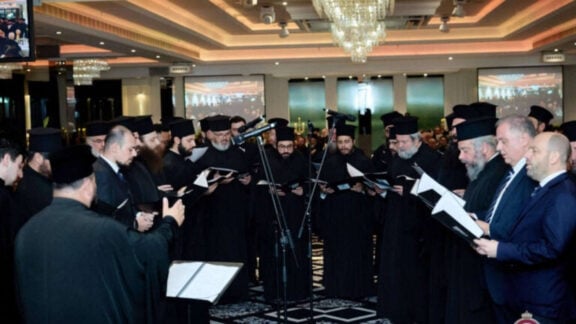At the time of writing this only 177 Greek citizens living in Australia had registered to vote in the upcoming Greek national elections, however this underwhelming response is not indicative of voter apathy, but rather the strict conditions imposed by the Hellenic parliament. The legislation, championed by socialist SYRIZA party and only reluctantly accepted by the new Democracy government, required an unwieldy 200 votes in parliament to be altered.
The process of registering to vote in Greece’s 21 May election has proven to be a complicated ordeal for many Greek Australians with dual citizenship. Numerous individuals have voiced their frustrations to Neos Kosmos, citing the application’s complexity as a major barrier to participation.
Adding to the difficulties, voters who are unable to navigate the electronic registration process must seek help from the consular authorities of their residing country.
However, this is no easy feat, as consulates are already burdened with understaffing and an overwhelming backlog of urgent cases.
The president of the Greek Community of Melbourne (GCM) Bill Papastergiadis blames the watered-down law.
“The law that was passed by the Greek Parliament does not effectively allow Greeks abroad to vote and that is the predominant cause for the low turnout, fundamentally there needs to be a change in the law, to allow appropriate access and we would see a fundamental shift in participation,” Papastergiadis told Neos Kosmos.
The president of the Community said that if “all Greek citizens abroad could vote, it would create a seismic shift in the relationship between the diaspora and Greece.”
Papastergiadis did not shy away from expressing his candid view that Greece is currently one of the few countries in the world with a two-tiered system of citizens – those who reside within its borders and those who do not.
Alexander Bilinis writer on Hellenism, and lecturer from Clemson University in the United States told Neos Kosmos that the “Greek bureaucracy has always been the perfect unofficial way to bar things from happening.”
”The current process is par for the course. No surprises here, to paraphrase what was often said about the military, ‘Where logic ends, the Greek state begins.’” Bilinis told Neos Kosmos.
Such a system raises concerns about the fairness and equity of Greece’s democratic processes, particularly in the context of the upcoming election.
“I pay taxes in Greece, I visit annually and have a life there, yet I am ignored,” Papastergiadis said.
Do the Greek consulates have the capacity?
Papastergiadis made it clear that his frustration is not with Hellenic consulates in Australia as he believes that they are “under-resourced and need far more support from Greece.”
So, do consular authorities have the bandwidth to assist expats in completing their electoral applications amidst the ongoing challenges?
Emmanuel Kakavelakis, the Consul General of Greece in Melbourne, said that as far as he is aware there have only been two or three people calling the consulate for advice.
“It’s a step-by-step process online, you need to show that you have lodged taxes in Greece and then you can do the whole thing electronically.”
“Even for me it can get a little complex, but it is a step-by-step process, and we have been advising Greeks eligible to vote since last summer, and there is still time to register,” Kakavelakis said.
The head of the mission called the new law a “breakthrough” however he admitted that due to many “differing opinions” in the Greek parliament, the law was watered down.
“I see it as breakthrough law, for the first time Greeks abroad can vote, it is a first step and as you know there was a lot of differing opinions and the proposed law had to be watered down to pass through parliament,” Kakavelakis told Neos Kosmos.
The consul general is still optimistic and believes that in time, “it will become more efficient and it is all electronic.”
Greeks from 69 nations applied to vote
The turnout of Greeks from 69 countries across five continents who have applied to vote in Greece’s 21 May elections is a testament to their unwavering commitment to participate in the democratic process. Notably, even citizens residing in far-flung countries such as Vietnam, Chile, India and southern Africa have expressed their desire to cast their ballot.
The lion’s share of applications has been received from the United Kingdom, particularly from the Greek community based in London. Out of the 23,034 total applications received, 17,370 have been accepted, while 4,086 are currently being processed. However, 1,578 have been rejected, indicating that the eligibility criteria for voting remain stringent.
The application process remains open until 12 April, with eligible voters entitled to apply up to 12 days before the official announcement of the election set for 24 April. Those who fail to meet the deadline will have to wait for the next election to establish their voting rights from their place of residence.
The diverse geographical spread of applicants is impressive, with applications received from countries such as Peru, Congo, Venezuela, Vietnam, Kenya, Lebanon and Mexico, among others. The Greek diaspora in South American countries, including Chile, Uruguay, Brazil and Argentina, have also enthusiastically contributed to this democratic process. The active engagement of expatriate Greeks is a positive development that reflects their desire to participate in shaping the future of their homeland.
Nine applications come from Thailand, 19 from Kuwait, 83 from South Africa and 65 from Singapore. In Seoul, South Korea, 41 citizens will vote and 17 in Japan, countries where the trip to Greece, in addition to the cost, exceeds 18 hours.
Five Greeks living in India, three in Kazakhstan and three in Ethiopia want to take advantage of the opportunity to vote on 21 May. Interestingly, 27 applications come from Russia.
Most applications have been received from countries in the Europe, where thousands of young people have migrated to work. The highest number of applications, 4,735, were submitted from the United Kingdom, with most of them coming from London (3,837). This is followed by Germany with 3,360 applications from 28 different cities, and Belgium with 1,559 applications.
From the United States come 1,723 applications from nine different cities, from Canada 224 and from Australia 177.
The conditions
It should be noted that Greek citizens who have an active right to vote
- must be registered in the electoral rolls, and
- be registered in the special foreign electoral rolls
Register on the platform
For the registration of those interested in the special electoral lists of foreign voters, they should:
- Have lived in Greece for a total of 2 years, in the last 35 years from the date of submission of the application
- Have submitted a tax return in the current or previous tax year (have personal Taxisnet passwords handy)
For registration in the special electoral rolls abroad, the process goes through the digital platform: www.apodimoi.gov.gr
In case of an application for the registration of a dependent member, the interested parties must select the field “Consent”, for the processing of personal data.
The registration steps
According to the instructions of the Ministry of the Interior and the relevant manual that has been published, the following steps are provided:
- Step 1: The voter enters the apodimoi.gov.gr application the corresponding codes of the Independent Public Revenue Authority (A.A.D.E.), is certified as a user and enters the application.
- Step 2: Then they search for their registration in the basic electoral roll and select it, so that their basic information is automatically filled in the application.
- Step 3: They enter their permanent residence address, contact telephone numbers and e-mail address. Choose the country and city in which they wish to exercise their right to vote, from the respective lists of the specific fields.
- Step 4: The voter then uploads electronic copies of the supporting documents of the conditions of paragraph 4 of article 4 of Law 4648/2019, i.e. “public documents of residence of two (2) years in the Greek Territory by choosing the public issuing body”.
Alternatively, the voter chooses the category of the supporting document, filling in the requested information, and authorizes the Ministry of the Interior to search for it ex officio.
If the voter is registered in the special foreign electoral rolls to exercise their right to vote in the European elections, in a polling station that will be established in a member state of the European Union, THE ABOVE JUSTIFICATIONS ARE NOT REQUIRED TO BE POSTED.
- Step 5: The voter confirms that the details of their application are true, and is aware that their application has the status of a responsible declaration and chooses to submit it definitively.
Upon successful submission of the application for voter registration, the voter receives an email confirmation containing a protocol number.
The verification process then commences, and if the application is accepted, the voter is added to the special foreign electoral roll for a duration of eight (8) years. Conversely, if the application is rejected, the voter is notified of their right to appeal.
If voters encounter difficulties completing and submitting the online application for voter registration, they may approach the relevant consular authorities in person. With the assistance of an accredited consular employee and their VAT number, applicants can complete and submit their application in accordance with article 4 of Law 4648/2019, accessible at apodimoi.gov.gr.
However, should voters reconsider and opt to exercise their right to vote in Greece, they may withdraw their application up to three days prior to the official announcement of national elections. This provides them with the opportunity to vote in-person at the election department in which they were initially registered in Greece, thereby affirming their right to vote.









